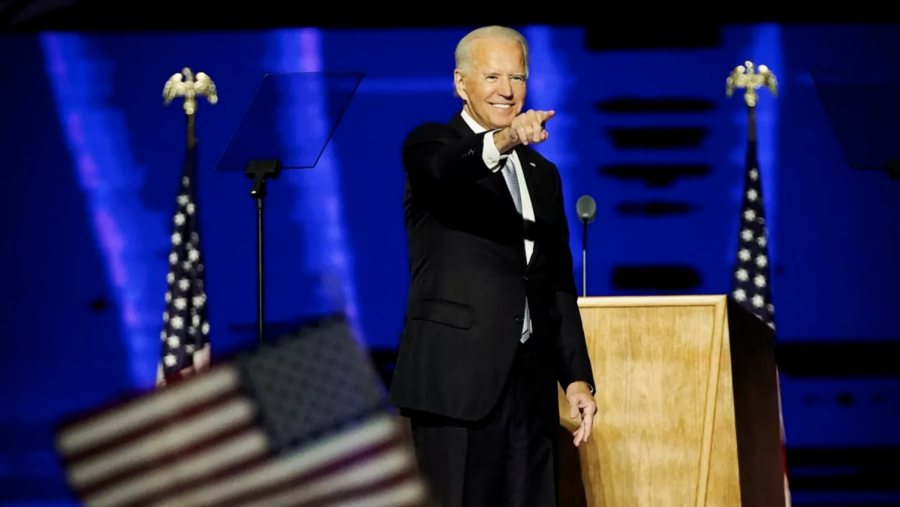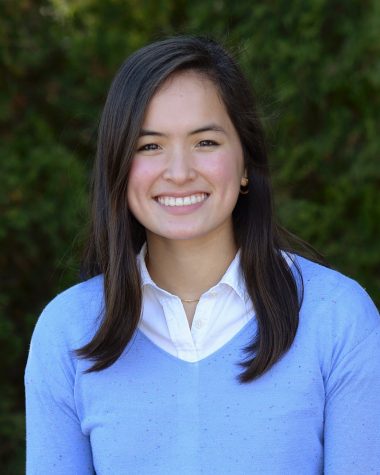“We Are Not Enemies”: An Op-Ed
November 11, 2020
On Saturday night, former Vice President Joe Biden addressed the nation in his first speech as President-elect. After an election plagued with hostility and polarization, Biden sought to unite the country across political lines.
“I pledge to be a president who seeks not to divide, but to unify,” Biden said. “Who doesn’t see red and blue states, but a United States.”
President-elect Biden extended a conciliatory hand directly to Trump voters, saying, “I understand your disappointment tonight. I’ve lost a couple of elections myself. But now, let’s give each other a chance. It’s time to put away the harsh rhetoric. To lower the temperature. To see each other again. To listen to each other again. To make progress, we must stop treating our opponents as our enemy. We are not enemies. We are Americans.”
I applaud President-elect Biden for this unifying message, and I sincerely hope he can successfully foster this collaborative atmosphere on Capitol Hill. Yet, I am skeptical that our nation can truly overcome four years of polarization, division, and vitriol. Politicians — and the American people — have undeniably become more eager to fight than to listen, and more willing to demonize opponents for political gain.
As I watched Biden’s speech, I reflected on my own experiences with political partisanship and pondered how our school can play a direct role in promoting civility. After all, Biden’s message mirrored those of our own school leadership. I’m grateful that St. Luke’s values civil discourse, and I’ve been continually impressed by my classmates in the DLC and Feminism Club, who take initiative by organizing Dive-Ins and panels for our school community.
I have attended almost every Dive-In over the years, and each has been respectful and productive. My classmates have listened to my perspective with empathy, and I have been challenged to weigh their opinions and scrutinize my own. For instance, last spring’s Dive-In surrounding the brutal killing of George Floyd opened my eyes to the challenges that Black members of our community face every day, both at school and away from campus, and helped me build a greater understanding of racism and discrimination in our country.
But after attending Dive-Ins and CGL groups, I am always struck by their lack of political diversity, as I often find myself as the only conservative in a sea of passionate liberal students. I truly cannot remember hearing another conservative voice at these events; if there are other conservative attendees, they do not share their opinions.
To be clear, this ideological uniformity is by no means a fault on the part of the event leaders, whom I commend for organizing these conversations and encouraging all St. Luke’s students to attend. Rather, I believe it is a symptom of two realities: the fact that conservatives are a tiny minority on the Hilltop, paired with a wider school culture, in which these students feel hesitant or ashamed to speak out. Political partisanship still pervades our halls in direct and covert forms, a culture I’ve seen firsthand as one of the few conservative students at SLS.
This atmosphere is undeniably shaped by students’ engagement on social media. I often discuss politics in casual school settings like lunch and advisory, and my friends always welcome and respect my opinions. But students’ in-person comportments are often completely unlike their online demeanors. My social media feeds are consistently filled with messages like “If you don’t vote for Biden, you’re dead to me” and “If you support Trump, and I mean this in the most disrespectful way possible, I want nothing to do with you.”
These posts create a toxic environment by promoting one-dimensional perceptions of political ‘opponents’ and fostering animosity between friends. While I know my peers to be empathetic and kind, I suspect that people who do not discuss politics at school are intimidated by their friends’ posts on social media. Students are afraid to speak up in person for fear of the retribution threatened in these posts, showing how vitriolic social media use can block civil discourse before it even starts.
The effects of this culture are obvious when conservative beliefs are not adequately represented, making political discussions into an echo chamber of sorts. When conversations only include one perspective, the conversation is ultimately unproductive because its participants are not challenged to consider opposing points of view.
But perhaps more importantly, uniformity can be damaging when it perpetuates incorrect assumptions, even unintentionally. Nowhere was this more apparent to me than in the recent Dive-In surrounding Justice Amy Coney Barrett’s appointment to the Supreme Court. I could not attend the event due to a scheduling conflict, so I watched the recording, which was posted for public view on the Feminism Club’s Instagram.
The conversation inevitably reached the subject of abortion, a key topic in the debate around Justice Barrett’s confirmation. One student asked the group to explain why people might choose to be anti-abortion. I watched as participants claimed that pro-life advocates only justify their belief using religion, and that their position is rooted in a lack of empathy and a desire to control women. No one voiced a contrary opinion, and I was disheartened that the faculty in the meeting said nothing to challenge this narrative nor suggest a more nuanced reason why people might oppose abortion.
I applaud our student leaders for creating opportunities to have difficult conversations, and I am grateful to have classmates who are willing to share their perspectives and ask hard questions. I don’t hold this exchange against the participants; after all, how can you discuss a belief you have never encountered? But to truly unify and progress as a community, we must prevent ourselves from accepting harmful assumptions — even unintentionally — by ensuring that opposing beliefs are adequately represented in conversation. Every student and faculty member, regardless of political ideology, can play a part in this effort.
Undoubtedly, deescalation of political tension must begin on social media. I challenge students of all ideologies to carefully consider whether your post makes harsh and unfounded generalizations. Political beliefs are often much more complex than they might seem, so ask yourself if your post is helping to advance a position or solely meant to disparage a community that you may misunderstand.
It is equally important to maintain this respect and empathy through personal interactions. If you are part of the political majority, keep organizing Dive-Ins and encourage all of your peers to attend. Try to welcome opposing perspectives in conversation, whether it’s at formal events or just at the lunch table. To understand the nuances of every conversation, scrutinize your own beliefs and keep asking the hard questions.
Even further, I challenge student leaders and faculty members at these events to speak up when the conversation is one-sided. Fairly presenting an opposing belief not only prevents discussions from becoming unfair or incomplete, but benefits every participant by forcing them to consider new perspectives.
However, students in the minority must also play an active role in this effort. As the only outwardly right-leaning student in the room, I often feel like the sole representative of the conservative point of view. While we may be few, I know that there are more conservative students at St. Luke’s than those who attend these discussions. But if we want our beliefs to be considered and respected, conservative students must make a deliberate effort to attend Dive-Ins, speak up in CGL groups and contribute to political discussions in the classroom.
I don’t mean to suggest that it is easy to voice an often scorned belief; I know that it is daunting to feel like the only person who disagrees with what the rest of the classroom is saying. But if there is one thing that I have learned after engaging in political discussion, it is that people will respect you for offering a different point of view and standing firm for your perspective. So don’t cower or hide your beliefs; practice self-advocacy while you’re surrounded by friends and teachers who know and support you. If you find a social media post to be unfair, privately talk to your friend about it and explain your disagreement. Be bold; express your opinion respectfully and thoughtfully, and listen to your peers with the same open-mindedness that you would expect from them. If you allow them to challenge your views as you challenge theirs, we will all benefit as we grow as thinkers and advocates.
As we begin a new chapter in American political life, I hope our community can embrace the messages of unity and civility promoted by our student leaders, school administration, and President-elect. Take small steps towards understanding by being open to conversation and challenging your own beliefs, because unity begins with an ear to listen.





Cynthia Kim • Jan 13, 2021 at 9:12 am
We are very proud of you Elyse. I hope your words encourage your peers and the faculty at St Lukes regardless of their political position.
Jennifer Foster • Jan 9, 2021 at 6:59 pm
So well written and thoughtfully presented Elyse!